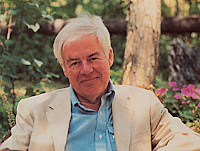Thursday, August 30, 2007
Maybe We Should Yell at Them
Wednesday, August 29, 2007
On Evites

On God's Glory
Sacramentalism as Contra-Nominalism
Tuesday, August 28, 2007
A Bit of [Over the Top] Nostalgia on the Eve of Another Year

My mom took pictures of my sister and I, carrying our lunchboxes, leaving the house for the school bus (the school bus where I learned the ways of the world insofar as I know them at all); later she and my dad would drop me off at school and settle me into my dorm room (she always made up my bed for me). Except for the years I was homeschooled--I didn't have to worry about first-day outfits and there were no pictures or stomach aches. Alas, this is probably the beginning of my last year of classes, and, hence, worth noting well.
On Woman's Approach to Vocation
Monday, August 27, 2007
On Tradition and Love
 I wonder if tradition and love are antithetical to, or at least in tension with, one another. In Fiddler on the Roof, we see that love is a revolutionary force that forces tradition to bend (and almost break). Love pushes against the tradition of matchmaking and questions the tie of marriage to the community (by asserting that that tie is beneficial, but not necessary). Perhaps love supplements tradition by bringing the universal to bear on tradition--by maintaining that even the stranger is a person worth loving (worth loving not as a stranger or as an other, but worth loving as a neighbor or as one's own people).
I wonder if tradition and love are antithetical to, or at least in tension with, one another. In Fiddler on the Roof, we see that love is a revolutionary force that forces tradition to bend (and almost break). Love pushes against the tradition of matchmaking and questions the tie of marriage to the community (by asserting that that tie is beneficial, but not necessary). Perhaps love supplements tradition by bringing the universal to bear on tradition--by maintaining that even the stranger is a person worth loving (worth loving not as a stranger or as an other, but worth loving as a neighbor or as one's own people).Fiddler on the Roof also raises the question of what is the nature of tradition and what is central to it. For instance, as the Tevya and his family leave Anatevka, their farm, their people, etc., there is still a sense that they will carry their tradition with them. Is it in their scrolls and religious imagery, which they pack up and carry with them? Is it in the way that they leave that they adhere to their tradition? Do they know their tradition more deeply in the very act of leaving itself (for, as one of the character notes, the Jews have often been forced from their place)? Does tradition make sense apart from their land? I think that the message of the film, at least, yes.

Saturday, August 25, 2007
My Graveyard
Thursday, August 23, 2007
On Proper Conversion
The future cardinal was convinced, even then, that he had not abandoned one iota of his Jewishness. To say he had, he once explained, “is like denying my father and other, my grandfathers and grandmothers”. He had kept the name Aaron as his first name at baptism, only adding Christian ones. ...
He taught himself Hebrew in readiness for his aliyah, or formal return to Israel. Every detail of his funeral, with its two rites, he carefully arranged himself. Then he wrote his epitaph: I was born Jewish. I received the name of my paternal grandfather, Aaron. Having become Christian by faith and baptism, I have remained Jewish. As did the Apostles.
Newman would approve.
On Sacramentalism
Perhaps this is connected to the distinction between will and being as the foundation for ethics: so Calvinists would root ethics in God's will and allow that that will might act arbitrarily. Calvinists might maintain that seeing ethics as derived from God's being places intolerable limits on God.
Wednesday, August 22, 2007
For the Record
My dad took off work and we went, first, on our five-mile walk (that day to my cemetery, which is on a hillside--one of the beautiful places of the earth). Then, we played tennis and picked out an engagement ring for my mom (she sort of proposed to my father, so she had never gotten one). Then we went tubing down our creek. At the end of the day, we watched Braveheart (it was my first time to see the film).
Tuesday, August 21, 2007

Besides the pure delight of a film in which the love of Christianity and beauty and art trumps the rules of Calvinism, A River Runs Through It is also worthwhile for its articulation of the sacramental--it is through engagement with the world and with family through fly fishing that Paul is finally redeemed. He doesn't reject the love of his father and brother, although he cannot fully accept it. And through the [totally depraved and, hence, problem-filled] process of giving and receiving love, the whole family becomes grows in virtue.
Fly fishing represents a respect for tradition and continuity (ironically, it is Paul who never leaves Montana). Although in some ways (such as in not eating his oatmeal), Paul bucks tradition, he finally continues in it, and this is his saving grace.
What rings more true than the wild second-born who also constantly seeks affirmation from the more straight-laced first-born?
On the Inhumanity of Nametags

Wednesday, August 15, 2007
On Historicism

Anti-foundationalist philosophy professors like myself do not think that philosophy is as important as Plato and Kant thought it. This is because we do not think that the moral world has a structure that can be discerned by philosophical reflection. We are historicists because we agree with Hegel's thesis that "philosophy is its time, held in thought". What Hegel meant, I take it, was that human social practices in general, and political institutions in particular, are the product of concrete historical situations, and that they have to be judged by reference to the needs created by those situations. There is no way to step outside of human history and look at things under the aspect of eternity.
Philosophy, on this view, is ancillary to historiography. The history of philosophy should be studied in the context of the social situations that created philosophical doctrines and systems, in the same way that we study the history of art and literature. Philosophy is not, and never will be, a science – in the sense of a progressive accumulation of enduring truths.--Richard Rorty, "Democracy and Philosophy"
Ah! Historicists frighten me, but perhaps even more so does Rorty's assumption that literature and art are confined to that same historicism (I think one aspect of my project will be to encourage the reading of literature in the same way that I think it is possible to read the history of philosophy--i.e. as able to contribute something significant to current political discussions).
P.S. He looks so harmless in this picture, especially with the flowers--one would think that he believed in art and literature...
Monday, August 13, 2007
Closet Kantian

Sunday, August 12, 2007

I'm really a big fan of the New York Times's recent attention to the hypocrisy involved in chic, ostensibly environmentally friendly people buying water bottles when the water in America is quite alright to drink. Every time I read an article about it (okay, only twice thus far), it warms my heart and reinforces my never-flagging (if naive) faith in the New York Times.
Wednesday, August 8, 2007
An Old Man Like the Judge Dreaming of the Past

Tuesday, August 7, 2007
On Sunday Mornings
 Sunday brunch is my favorite time to be out and about (although we more often are in--making french toast or pancakes at our house for brunch). It may be because so many people don't go to church and they feel like it's a free morning (as opposed to Saturday--for which there are lists of errands to do), and they walk in comfortable weekend clothes with sunglasses and a coffee or read the newspaper. Perhaps it's a beautiful holdover from old puritan Sunday laws.
Sunday brunch is my favorite time to be out and about (although we more often are in--making french toast or pancakes at our house for brunch). It may be because so many people don't go to church and they feel like it's a free morning (as opposed to Saturday--for which there are lists of errands to do), and they walk in comfortable weekend clothes with sunglasses and a coffee or read the newspaper. Perhaps it's a beautiful holdover from old puritan Sunday laws.
Monday, August 6, 2007
I am Sixteen, Going on Seventeen (or On Regret)
Thursday, August 2, 2007
Rant (Third in an Occasional Series)
I knew I liked Bourbon...
"It is often written that many of the original distillers of bourbon were Pennsylvanians fleeing taxation during and after the Whiskey Rebellion, but this claim is widely disputed."

.jpg)
